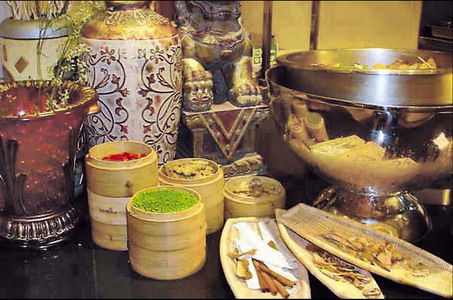Douglas Williams/Shanghai Daily news
For a taste
of Malaysian cuisine and culture, a hungry gastronome who likes living on the
culinary edge could do worse than get along to the Mayfair Hotel Shanghai on
Dingxi Road, opposite Zhongshan Park, for the Malaysian Food Festival.

Malaysian food bursts forth with flavors at the Malaysian Food
Festival in Mayfair Hotel Shanghai.
The festival is taking place there every Friday, Saturday and Sunday this
month with Sundays offering the added treat of an energetic Malay dance troupe
who from seven whirl and hoot their way though a dazzling array of costumes and
movement told stories, few of which I understood but there could be no doubt
that high drama featured. "Malaysia: The Essence of Asia," their superbly titled
and thrilling song finale.
Mayfair is very easy to find, the last stop of
Metro Line 2, Zhongshan Park, exit five, right and in the event of heavy rain, a
typhoon even, the short walk from the underground station to the hotel is
thankfully covered.
The all-you-can-eat, all-you-can-drink buffet at 198 yuan
(US$24.5) is good value allowing as it does plateful after plateful of
delicious, genuine Malaysian food and a continuously refreshed
glass.
Malaysian food is a triumvirate of Indian, Chinese and Malay
influences and three times better for it. Articulate guest chef KK Lee from
Kuala Lumpur, in charge of the food in the festival, described his country's
food as "moderate." That is in relation to Thai food which Lee ingeniously
described as "radical." His meaning is clear - where Thai food, whilst tasty,
has the potential to blow your head off, Malaysian food is mostly just
tasty.
Ikan baker, grilled fish in banana leaves; ketam masak, crab in spicy
coconut gravy; kerabi ikan, fish salad and rendang daging a rich beef curry,
traditionally water buffalo, explode with flavors sweet, sour, coconut and
moderately spicy.
Sweets like ketayap, a coconut roll, require a sweeter than
usual sweet tooth but are just the ticket none the less. There is a wide
selection of extra especially kiddie friendly deserts which comfortably keeps
the small people smiling.
There is a long history of Chinese traders in
Malaysia and today almost a quarter of Malaysia's population is of Chinese
ethnicity. Chef Lee recalls a more honest time from his youth when satay kebabs,
introduced originally to Malaysia by Chinese traders from Fujian Province, were
consumed by the handful.
"Once you'd eaten as many kebabs as you could, you'd
count up how many skewers you had and calculate the bill from that. I think now
people would hide the sticks. The kebabs are traditionally three pieces of meat
and actually in the Fujian dialect satay means three pieces," says
Lee.
Shanghai restaurateurs, or should that be Shanghai hoteliers, really
have taken to buffets like the proverbial to the cliche with a buffet of buffets
available across the city especially at the weekend. Some people like the value
- guaranteed to leave full to bursting and the variety - a bit of everything.
Others, like me, regard the experience of mingling and shuffling with fellow
diners cruising the various options and invariably finding I've missed the best
main just as I've settled on my dessert less than relaxing and not the full
monty in terms of a dining experience.
Then there's the ongoing musical
accompaniment fiasco. No music is most definitely better than bad music. The
Mayfair diners, on the night Shanghai Daily visited, were exposed to some
interesting if intense traditional Malaysian music accompanying the dancers:
fair enough.
The trouble was that vying for attention was some truly banal
piano plink plonk, filtering up from the lounge below, from a pianist-less grand
piano and resulting in such an aural smorgasbord as to induce pangs of
biliousness.



